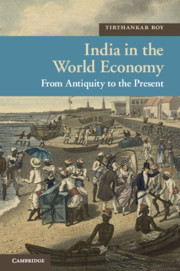Book contents
- Frontmatter
- Contents
- Figures and Tables
- Preface
- 1 Introduction
- 2 Ports and Hinterlands to 1200
- 3 Receding Land Frontiers, 1200–1700
- 4 The Indian Ocean Trade, 1500–1800
- 5 Trade, Migration, and Investment, 1800–1850
- 6 Trade, Migration, and Investment, 1850–1920
- 7 Colonialism and Development, 1860–1920
- 8 Depression and Decolonization, 1920–1950
- 9 From Trade to Aid, 1950–1980
- 10 Return to Market, 1980–2010
- 11 Conclusion
- References
- Index
- References
7 - Colonialism and Development, 1860–1920
Published online by Cambridge University Press: 05 July 2012
- Frontmatter
- Contents
- Figures and Tables
- Preface
- 1 Introduction
- 2 Ports and Hinterlands to 1200
- 3 Receding Land Frontiers, 1200–1700
- 4 The Indian Ocean Trade, 1500–1800
- 5 Trade, Migration, and Investment, 1800–1850
- 6 Trade, Migration, and Investment, 1850–1920
- 7 Colonialism and Development, 1860–1920
- 8 Depression and Decolonization, 1920–1950
- 9 From Trade to Aid, 1950–1980
- 10 Return to Market, 1980–2010
- 11 Conclusion
- References
- Index
- References
Summary
The British Empire represented a watershed in the relationship between India and the world economy, one with far-reaching effects on both enterprise and labor in the region. Yet, the processes by which the empire led to economic change often get obscured in ideological debates about development and underdevelopment. What were these processes? In this chapter, the question is explored. I suggest that market integration via institutional and technological change should be the starting point in this project. It is necessary, however, to begin with a developmental discourse on the empire.
Perspectives on empire
Early theories of economic imperialism, introduced by J. A. Hobson and V. I. Lenin in particular, held that the nineteenth-century European expansion into the tropics expressed a necessity for capitalism to reach out to the periphery in order to avert a falling return to capital in the core. Critics of the view countered that the attraction of the periphery was a more important driver behind capital export than was crisis at the core. Sporadically from the 1950s, and more systematically from the 1960s, Marxists helped place this debate at the heart of the discourse on comparative development. The European empires in Asia and Africa emerged during a period that also saw the onset of modern economic growth in Europe and a rise in economic inequality among regions of the world. Did empires cause inequality? The Hobson-Lenin process did not imply a rise in inequality; in fact, it could very well lead to the transmission of modern economic growth from Europe to the colonized world. The Marxists agreed that there was a link between empires and inequality but disputed the nature of the link.
- Type
- Chapter
- Information
- India in the World EconomyFrom Antiquity to the Present, pp. 181 - 209Publisher: Cambridge University PressPrint publication year: 2012



